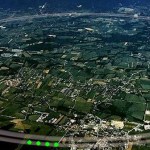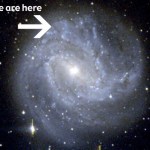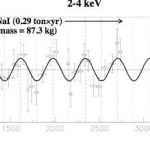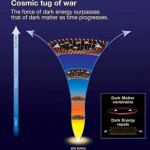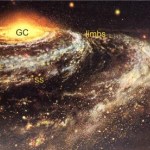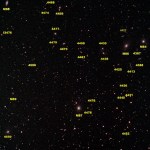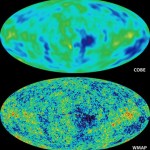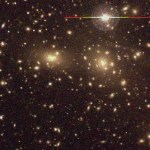dark
Image of eyeless Mexican tetra fish from www.seriouslyfish.com by H-J Chen.
The metabolism of most animals follows a circadian rhythm that differs between the day and night. Mexican cavefish living in constant darkness, lost this circadian rhythm some time ago. In a newly published study in PLOS ONE, researchers compared the metabolic rate of both cave- and surface-dwelling Mexican tetra fish (Astyanax mexicanus). They hypothesized that since the fish living in each location naturally experience differences in food, predation as well as exposure to daily light fluctuations, they might also…
So I was coming upstairs after talking to the digits about the things you talk to digits about, when a little beep came from my mobile receiving a text message and I just knew it was going to be the outing coming On. 4pm on a cold dark monday with only 4 people signed up: I thought there was a fair chance of it being cancelled and me getting a chance to work late (oooh how I love a chance to work late). But no, thanks to James (the one how lives on a boat, except that isn't specific enough, the one who lives on a boat and has a cat not a dog, that will do) we were out in the Four of Death (…
Cold, isn't it? And quite dark too (is that the [[Equation of time]]?).
But I'm rather enjoying this snow - it is clear and crisp, so far. I've only fallen off once.
[Update: Looks cold but lovely from above [http://news.bbc.co.uk/1/hi/in_depth/8447023.stm
]. Mind you, it is warm elsewhere]
There are sandals underneath that, in case you'd missed how hard I am :-)
Her Dark Satanic Mills
Paul Taylor
When I saw Paul Taylor's massive paintings at Artomatic, I immediately thought of two things: fire and Blake's etchings. So I was tickled that the title, "Her Dark Satanic Mills," refers to a poem by Blake, and that Taylor's creative process is all about fire:
The medium is essentially highly flammable furniture stripper gel - set on fire of course. They are canvas pieces mounted on Luan, covered in Polyurethane to protect the canvas. The gel is applied, somewhat in a Pollock-like manner, lit, and then the process takes on a John Cageian-like "chance…
I'm not someone who gets as excited about science-fiction space shows as many other science bloggers, but I am a fan of the current Battlestar Galactica and, especially, of Star Trek: The Next Generation. But there's one man who stands out as the hero of Star Trek: TNG, and it's the seasoned, savvy, courageous and confident Captain Picard:
Now Patrick Stewart is one cool guy, but he's nothing compared to the starship captain he played. Back in 2001, a band named Dark Materia made a techno song about Captain Picard called The Picard Song, and for me, the combination of bad techno, sound bites…
(This is adapted from my public lecture, Afraid of the Dark: How We Know What We Can't See.)
Let's go back over 200 years ago, to 1781. William Herschel (left) discovered the planet Uranus, noticing that an object, as bright as a star, was actually moving relative to the other stars. The other five inner planets (besides Earth) were known for over 2000 years before that. But it was thought for a long time that Saturn was the farthest one.
But it clearly isn't; as you can see with modern telescopes, Uranus is a super-interesting planet, rotating on its side, surrounded by rings and moons.…
Hector writes in and asks about someone from Sheffield in the UK who says that the Large Hadron Collider (LHC) will create Dark Matter:
The massive ATLAS detector will measure the debris from collisions occurring in the Large Hadron Collider (LHC) which recreates the conditions found in the early universe during the Big Bang when Dark Matter was first created. If the LHC does indeed create such particles then it will be the first time that the amount of Dark Matter in the universe has increased since the Big Bang - the LHC will effectively be a Dark Matter 'factory'.
Well, Hector basically…
Can you believe that I had a fight today with someone who's been dead for over 350 years, and I'm losing? -- Ethan, yesterday
Of course you can believe it, when the man I'm fighting with is Johannes Kepler. I don't get a chance to tell you about my research very often, mostly because it's still a work in progress. But my latest paper was just submitted and is now out of the way, and so I'd like to tell you what I'm working on at the moment.
Well, there we are in the galaxy. We look up at the night sky, and we see our planets as well as all the stars that surround us. But you know what we don…
Remember how I told you earlier this week that DAMA was going to announce that they found dark matter, even though the signal that they found is not consistent with other experiments?
Looks like my powers of predicting the future are pretty damned good. They have a new plot with more data showing the continued modulation at a certain energy range:
and also one showing the fact that they see a bunch of extra events happening in that energy range:
So here's the stuff that DAMA has seen: a nuclear recoil that has many events in a certain energy range, and has a 2% annual modulation in that…
Yesterday, my good friend (and SWAB reader) Brian wrote a great comment about the practical reasons to explore space, where he talked about the overall economic impact that Space Exploration has had on the economy, as well as the impact it has had on our knowledge and understanding of the Earth, its environment, and how to manage/mitigate the threats to it. And that's wonderful for exploring our Solar System and others.
But what do I do in the meantime? After all, this isn't what I study or explore. So I asked this:
The practical arguments as to why exploration of space is worthwhile…
The DAMA collaboration, an experimental team searching for dark matter via direct detection, is poised to report this week that they have discovered Dark Matter. And I'm here to pre-empt that by bringing you the truth: no, they haven't.
They take some very cold (cryogenic) atoms,
look for nuclear recoils resulting from dark matter collisions, subtract the background, and draw conclusions based on whatever's left over. Their expectations are based on the following:
Neutrons, neutrinos, and other standard model particles from the Earth, the Sun, and the Milky Way galaxy will collide with the…
In a comment on my last post, What is Dark Energy, Kendall asks the following, which is such a good one I think it deserves its own post:
I thought the expansion was accelerating? Aren’t you saying that it is on its way down to 85% of its current rate? Sounds like expansion is slowing, but still leaves us with an open universe…
People do say the expansion of the Universe is accelerating. But that doesn't mean that the expansion rate is accelerating. It means that if you take a look at any one galaxy that isn't gravitationally bound to us in the Local Group (that is, any big galaxy that isn't…
You've all heard these words before. Dark Energy. But what is it, and why are we stuck with it? Let me start by telling you a story.
Imagine, for a minute, that you have a candle. You know everything about this candle, including how bright it is and how far away it is from you. Like so:
Now if I move this candle twice as far away, I know it's going to be one-fourth as luminous. If I move it three times as far away, I know it's going to appear one-ninth as luminous. And if I move it a thousand times farther away, I know what I see is going to be one-millionth as luminous as the original…
So last week I was up at Pacific University in Portland, OR for a job interview. As part of a faculty interview, you have to lecture on a topic for undergraduates, but they give you the topic just a couple of days before. My topic was Gauss' Law, which talks about the relationship between an Electric Field and an Electric Charge. Well, the same law holds for Newton's theory of Gravitation with a gravitational field instead of an electric field and a gravitational charge (i.e., mass) instead of an electric charge.
So I'm at work today thinking about this, doing the thing I do messing around…
Aaah, the Virgo cluster. A huge cluster of hundreds of galaxies, and our closest large neighbor in the Universe. People have known for a long time that although Virgo is still redshifting away from us, it isn't quite as fast as we would expect from the Hubble expansion rate of the Universe. Does this mean that we're gravitationally bound to it, and some day, we'll move into this dee-luxe apartment in the sky?
Nope. Dark energy is here to push it away from us, and we'll unfortunately see this bright neighbor recede farther and farther from us, until it disappears from our sight. So say your…
So I gave a public lecture last (Monday) night called, "Afraid of the Dark: How We Know What We Can't See" and videotaped it. Now, I'm pretty good at what I'm doing right now (research in theoretical cosmology), but I'm really good at public speaking and teaching, and here is me telling a public audience all about dark matter, how we know it exists, what makes it different from normal matter, and what I'm trying to do to find it/discover its nature for a good 40 minutes. (The intro and question/answers are cut out).
It was a lot of fun; the audience was wonderful, and actually kept me for…
The cosmic microwave background is the radiation left over from the big bang. It's very uniform, 2.725 Kelvin everywhere. We're moving with respect to it, so there's a doppler shift, and we see that as a dipole moment in the Temperature. When we subtract that out, we see variations on the order of 30 microKelvins! WMAP is a satellite (Wilkinson Microwave Anisotropy Probe) that measured these anisotropies, and they just released its year 5 data. First off, with the uniform and dipole parts subtracted out, and with the foreground from the galaxy also taken out, here's the map of the microwave…
Last week, Pamela Gay over at Star Stryder pointed me to a press release which claimed that, among other things, perhaps dark matter wasn't necessary. So I wrote a guest post on her blog explaining why it was. Apparently, some people still aren't convinced. So I will lay out for you all the reasons I can think of why we need it, and explain what happens if you try to do without it.
1. Cluster Velocity Dispersions. When we take a look at galaxies, we often find hundreds or even thousands of them clustered together, like in the Coma Cluster. We can measure how quickly those galaxies are moving…



